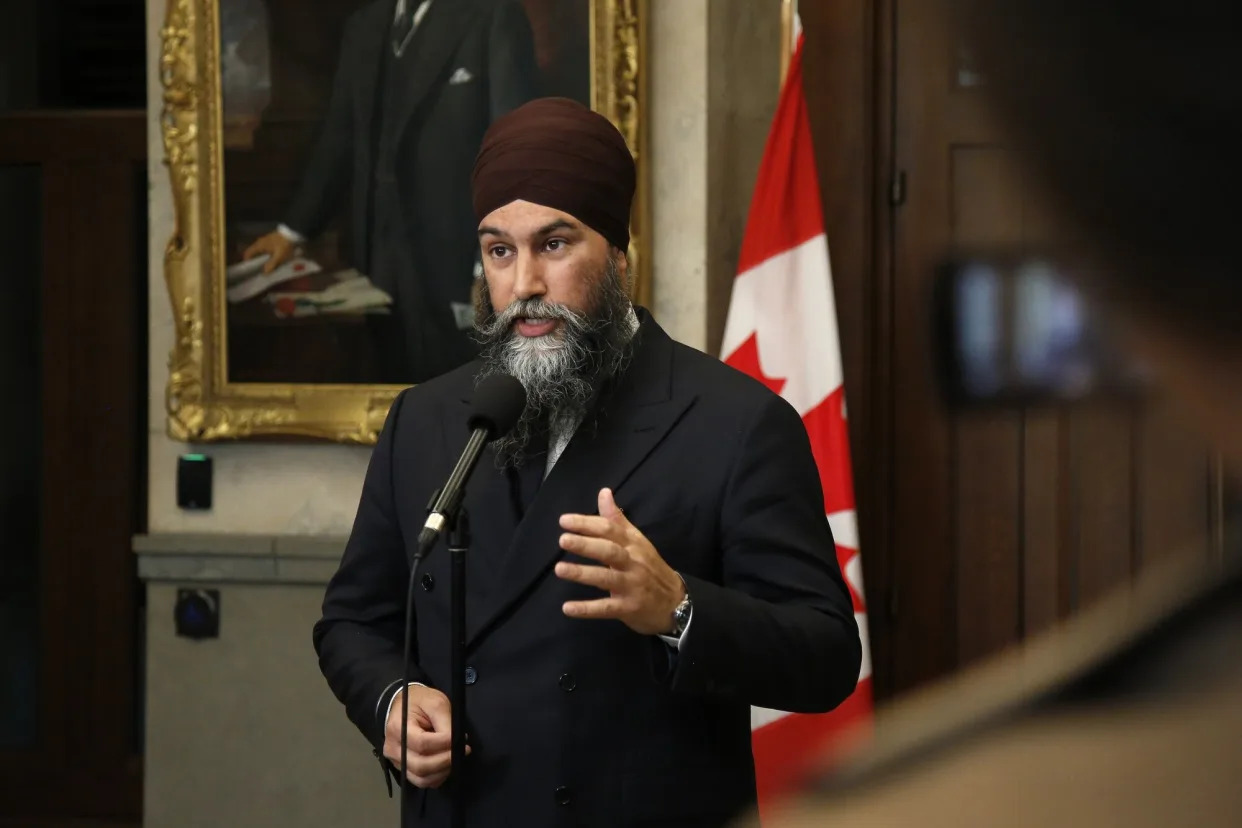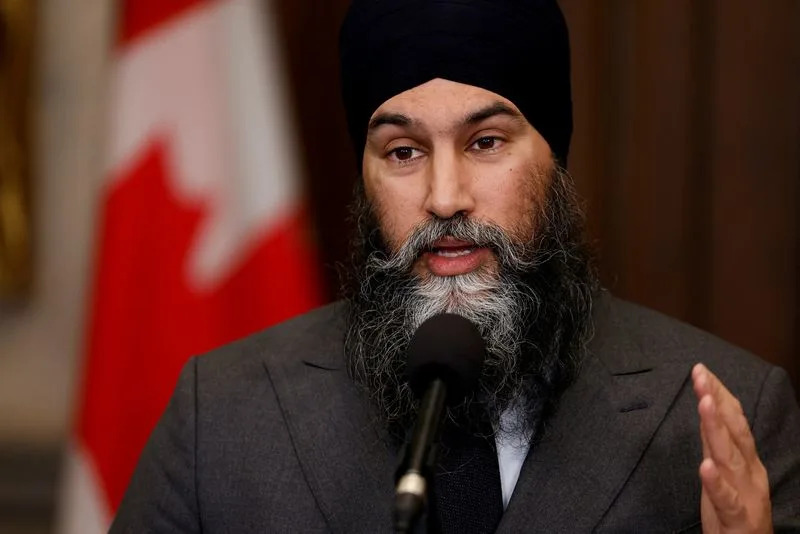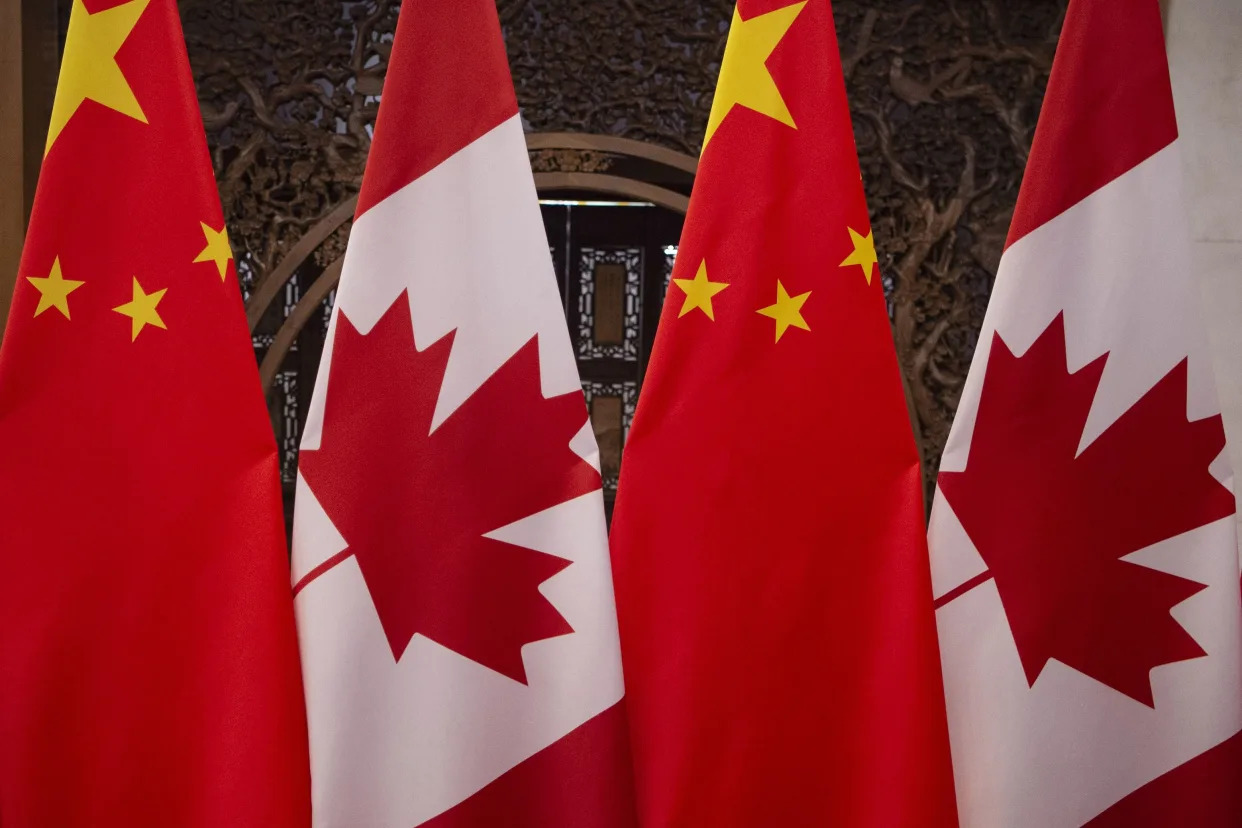Thomas Seal
Fri, 14 June 2024

(Bloomberg) -- The leader of Canada’s third-largest national party said some of the country’s lawmakers were “traitors” who should be banned from Parliament and face prosecution after he read a classified report on foreign interference in the democracy.
“What they’re doing is unethical, it is in some cases against the law, and they are indeed traitors to the country,” said Jagmeet Singh, leader of the New Democratic Party.
Singh spoke on Thursday after reading an unredacted version of a report on foreign interference from Canada’s National Security and Intelligence Committee of Parliamentarians. He declined to share the names of lawmakers allegedly accused in the report of working for foreign states, saying that doing so could jeopardize national security efforts.
A redacted version of the document was published on June 3 and said that China and India are the biggest perpetrators of foreign meddling. NSICOP is a senior, cross-party group of lawmakers with “top secret” security clearances.
The NDP supports Prime Minister Justin Trudeau’s government in a Parliamentary confidence deal, but Singh accused the country’s leader of being soft on foreign interference.
Foreign Interference
“It’s clear that he accepted a certain level of knowledge of foreign interference and didn’t do anything,” Singh said at a press conference on Thursday, adding that the prime minister delayed swift action “and doing so sends a message that some level of interference is acceptable.”
A spokesperson for Public Safety Minister Dominic LeBlanc said in an emailed statement that foreign interference shouldn’t be a partisan issue.
“Our government has been clear – any attempt to interfere in Canada’s democracy is completely unacceptable,” LeBlanc’s office said. “Over the last number of years, we have taken action to detect, disrupt and counter those attempts,” including by establishing the public inquiry.
Canada is holding a public inquiry into foreign interference that last month concluded in an interim report that there were attempts from foreign actors, particularly China, to sway its elections in 2019 and 2021. The report said those efforts didn’t affect the outcome of the elections.
Trudeau ordered the hearings after media reports cited classified intelligence memos that Chinese meddling may have helped certain Liberal Party candidates get elected.
In his remarks about Trudeau, Singh referred to an alleged incident described in the report: In 2019, Liberal officials were notified by Canada’s spy agency CSIS about allegations of possible Chinese efforts to influence a nomination contest for a Liberal seat. After receiving caveatted information, and being advised by his campaign director not to remove the candidate, Han Dong, Trudeau didn’t intervene.
Dong, who was eventually elected, has rejected the accusations. He later resigned from the Liberal Party.
Conservative Party
Singh added that the document indicated that he, personally, was also a target of overseas efforts.
Singh also accused Trudeau’s main rival, Conservative Party leader Pierre Poilievre, of willful ignorance and dodging scrutiny on the subject, citing the report’s description that Conservative Party leadership races were also targeted for alleged interference.
Poilievre has opted not to accept confidentiality requirements to read the report, for fear they could hamstring his role in government scrutiny. Instead he has called for the names of witting accomplices in interference to be made public.
A Conservative Party representative said via email that if Singh “really has concerns that the prime minister has failed to take national security seriously and has failed to protect our democracy against foreign interference, then he should stop blindly supporting the Liberal government and let them face Canadians in an election.”
‘Vastly Relieved’
Other politicians have drawn different conclusions from the full report. On Tuesday, Green Party leader Elizabeth May said “there is no list of MPs who have shown disloyalty to Canada,” adding “I am vastly relieved.”
However, she did say that a parliamentarian, who no longer sits in the House of Commons and isn’t named in the report, shared confidential information with a foreign intelligence officer, and that that person should be investigated and prosecuted.
Singh’s NDP supports Trudeau’s Liberals, Canada’s biggest party, in votes, allowing them to form a government. Asked why he continues to do so given his concerns, Singh said he’s going to use his role in Parliament to demand answers, instead of pulling out of the pact and triggering a general election.
“The suggestion that an election is a solution to election interference is, I think, a fallacy,” he said.
--With assistance from Laura Dhillon Kane, Thomas Seal and Bill Faries.
Reuters
Thu, June 13, 2024

Canada's New Democratic Party leader Jagmeet Singh speaks to journalists before Question Period in the House of Commons on Parliament Hill in Ottawa
OTTAWA (Reuters) - The head of a Canadian political party said on Thursday that an intelligence report about some members of parliament acting as agents for other nations was concerning and that offending lawmakers must be removed.
Prime Minister Justin Trudeau has been on the defensive since a committee of lawmakers that focuses on security matters said in a heavily redacted report this month that some elected officials had been "witting or semi-witting" participants in foreign interference operations.
"I am more alarmed today than I was yesterday," Jagmeet Singh of the opposition left-leaning New Democrats said on Thursday, after reading an unredacted version of that report.
Singh, who as the leader of a major party exercised his right to request increased security clearance to read the documents, said the report showed Canada is vulnerable to foreign interference and weakened the confidence of citizens.
"If there continues to be no consequences for MPs who knowingly help foreign governments act against Canadian interests, we will continue to be an easy target," Singh said.
"Removing MPs who knowingly participate in foreign interference would have the deterring effect on this type of behavior," he added
In the report, which was based on information from intelligence agencies, the committee of parliamentarians did not reveal any names but said India and China were the main foreign threats to Canada's democratic institutions.
Singh did not name any lawmakers either, or say how many were named in the report or if any them were sitting MPs, but he added that the report gave him "no reason" to remove any members of his own party.
Ministers have said naming legislators would break the law and that it would be up to police to investigate.
On Monday, the Trudeau-led Liberal government, facing accusations it is soft on security, bowed to opposition demands to refer the matter to a special inquiry underway to assess allegations of foreign interference in last two Canadian elections.
The special inquiry, in an interim report, last month announced it had found evidence of foreign interference in those federal elections but said the results of the votes were not affected and the electoral system was robust.
Canada's main spy agency last month said persistent Chinese election meddling had the potential to undermine Canadian democracy. Beijing routinely denies accusations of interference.
(Reporting by David Ljunggren and Ismail Shakil; Editing by Bill Berkrot)
A 'cloud of suspicion' hangs over Parliament — and no one knows what to do about it
Releasing the names would not be so simple — and even NSICOP might not be able to clear the air entirely
CBC
Wed, June 12, 2024
Prime Minister Justin Trudeau responds to a question during Question Period, in Ottawa, Tuesday, June 11, 2024. THE CANADIAN PRESS/Adrian Wyld
There is a "cloud of suspicion" hanging over the House of Commons, Conservative MP Gerard Deltell said on Monday.
On this meteorological metaphor (if on nothing else), there is widespread agreement.
"A dark cloud hangs over all 338 members," Liberal MP Ken McDonald said.
"It is true that since the report landed with the force of a bomb last week, it has let a cloud of suspicion hang over this entire place," NDP MP Alistair MacGregor said.
"It puts us under a cloud of suspicion, a permanent cloud," Bloc Québécois MP Yves Perron suggested.
If a cloud now hangs over Parliament, it was created by parliamentarians who allegedly collaborated, deliberately or otherwise, with hostile foreign states — or at least by the intelligence sources that relayed those allegations to Canada's national security agencies.
Green Leader Elizabeth May says there's no list of disloyal current MPs in unredacted NSICOP report
Liberals support push to have public inquiry probe claims that parliamentarians helped foreign states
A report claims certain parliamentarians colluded with foreign states — could they be charged?
That cloud was then dangled over Parliament Hill last week by the National Security and Intelligence Committee of Parliamentarians (NSICOP) when its members chose to float those allegations without naming the individuals in question.
NSICOP suggested that MPs or senators have acted "contrary to the oaths and affirmations Parliamentarians take to conduct themselves in the best interest of Canada." But the committee did not say how Parliament should proceed from there — what should be done now that unnamed members have been broadly accused of serious wrongdoing.
Left to their own devices, parliamentarians have been unable to arrive at a resolution. And in lieu of a clear path forward, the House of Commons has decided to ask for more help — this time from Justice Marie-Josée Hogue's commission on foreign interference.
It remains to be seen if Hogue can bring more clarity to a situation that is crying out for it.
The challenge with naming names
It is the Official Opposition's view that the government simply needs to "name names."
"I would remind the minister and the government that what is being asked of the government is not to make known to the public sensitive intelligence, or sources and methods," Conservative MP Michael Cooper told the House on Monday. "What is simply being asked of the Liberals, the government, is to provide the names of the compromised MPs and senators — just the names, please."
But just releasing the names wouldn't necessarily be so simple. Releasing names without any evidence or supporting information could be unfair to the named MPs or senators. Public Safety Minister Dominic LeBlanc also told a House committee last week that, in some cases, allegations against parliamentarians are tied to "uncorroborated or unverified" intelligence information.
Liberal MP Nathaniel Erskine-Smith has argued that demanding names without also demanding "due process" is "irresponsible." For the sake of avoiding a witch hunt, some kind of due process would seem sensible.
As Conservative MP Michael Chong reminded MPs on Monday, Parliament is empowered to govern its own membership and has the power to expel members. The last time Parliament exercised that power was in the case of an MP — Fred Rose — who was found to have spied for the Soviet Union. But in Rose's case, the House of Commons only voted to declare his seat vacant in 1947 after he had been convicted in court of violating the Official Secrets Act.
In this case, even NSICOP has acknowledged that criminal charges against the parliamentarians in question are unlikely.
Are party leaders taking responsibility?
Philippe Lagasse and Stephanie Carvin, two academics who have studied national security, have argued that the best — and perhaps only — path forward is for party leaders to take responsibility for their own caucuses.
In this scenario, each party leader would be given the security clearance necessary to view the intelligence that underpins NSICOP's report. The leaders could then take action to sideline or punish MPs whose activities are cause for concern — or even ban those MPs from running under their party banner again.
Erskine-Smith has argued that approach would raise questions of procedural fairness. On the other hand, as Lagasse and Carvin note, MPs and senators have been expelled from caucus for "far less."
Just Asking wants to know: What questions do you have about foreign interference in Canadian politics? How concerned are you about the latest report from Canada's national-security watchdog? Fill out the details on this form and send us your questions ahead of our show on June 15.
But what Lagasse and Carvin propose is premised on the assumption that all party leaders would be willing to cooperate and act.
It's not clear yet whether Prime Minister Justin Trudeau — who has ready access to classified information — has taken any action against Liberal MPs in response to the allegations contained in the NSICOP report. Conservative Leader Pierre Poilievre, meanwhile, is refusing to go through the security clearance process that the government has offered to him so that he can view an unredacted version of the NSICOP report.
Conservatives seem to view the offer as some kind of trap that would prevent Poilievre from questioning or challenging the government on the issue of foreign interference. It's not clear Poilievre wouldn't still be able to use parliamentary privilege to say whatever he wanted inside the House of Commons with impunity.
But regardless, his refusal to receive a security clearance could be preventing him from taking any of the actions that Lagasse and Carvin suggest.
Over to Justice Hogue
The other three opposition leaders — the NDP's Jagmeet Singh, Green Leader Elizabeth May and Yves-François Blanchet of the Bloc Québécois — have agreed to view the unredacted NSICOP report. Singh will apparently have his chance on Wednesday.
Speaking to reporters on Tuesday after being the first opposition leader to see the unredacted report, May said she came away feeling less suspicious of her colleagues.
She later told the CBC's Power & Politics that the unredacted report did not list the names of currently serving Parliamentarians accused of wittingly conspiring with foreign states — which suggests even NSICOP may not be able to provide much clarity.
Green Party leader Elizabeth May speaks while referencing a copy of a public security report during a news conference, in Ottawa, Tuesday, June 11, 2024. THE CANADIAN PRESS/Adrian Wyld
On Tuesday afternoon, the House voted 320-2 to effectively punt the matter to Justice Hogue (May and fellow Green MP Mike Morrice voted against). Appealing to an independent adjudicator makes some sense, but it might also be months before we know whether Hogue is able to meaningfully clear the air.
Kent Roach, a law professor at the University of Toronto, points out that section 13 of the Inquiries Act states that "no report shall be made against any person until reasonable notice has been given to the person of the charge of misconduct alleged against him and the person has been allowed full opportunity to be heard in person or by counsel." That suggests the foreign interference commission could offer due process and then name names.
But it's also conceivable that national security concerns could still stand in the way of releasing those names publicly. It also stands to reason that Hogue might find she is not able to definitively rule on any parliamentarian's guilt or innocence.
Either way, the cloud over Parliament is going to hang there for a while yet. And one way or another, parliamentarians will end up having to do something about it themselves.
Just Asking wants to know: What questions do you have about foreign interference in Canadian politics? How concerned are you about the latest report from the National Security and Intelligence Committee of Parliamentarians? Fill out the details on this form and send us your questions ahead of their show on June 15.
Jay Zhao-Murray
Wed, June 12, 2024

(Bloomberg) -- China’s new ambassador to Canada, Wang Di, has arrived in Ottawa amid a diplomatic chill between the two countries.
Wang’s predecessor, Cong Peiwu, returned to China in April following allegations that the Asian powerhouse had interfered in Canada’s elections to tip the scales toward candidates deemed favorable to Beijing.
The foreign interference scandal continues to cause turmoil in Canada, recently amplified by a new, heavily redacted report that alleged some Canadian parliamentarians were “semi-witting or witting” participants in foreign interference.
Canada is also weighing whether it needs to raise tariffs on Chinese-made vehicles after the White House announced major new levies on them. The European Union announced Wednesday it will bring its own levies on Chinese cars to as much as 48%.
Still, Canada’s Foreign Minister Melanie Joly has signaled her pursuit of “pragmatic diplomacy,” and the need to engage with China and some other non-like-minded countries. Her deputy minister, David Morrison, visited China earlier this year.
Wang was formerly the Chinese ambassador to Kuwait and served as the deputy director of West Asian and North African Affairs in the Chinese foreign ministry.
No comments:
Post a Comment